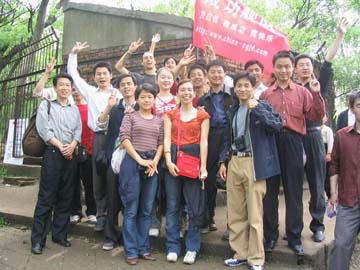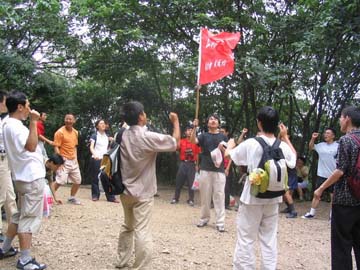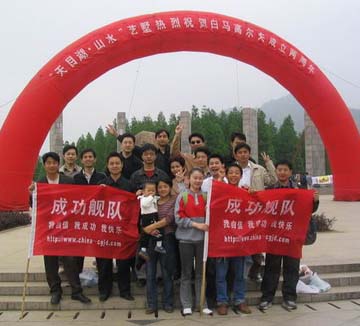Successful Breakthrough Therapy
 |
About the presenter: Li Qingsong is the Secretary-general of Nanjing Stutter Self-support Association in China. As an English-Chinese translator, he graduated from English Literature College and Chinese Literature College, Nanjing Normal University, Nanjing, Jiangsu and obtained a dual-bachelor degree and a Master degree in Literature. Later, he studied various business management courses. Currently, he works in a research institute as a full-time technician translator and a part-time freelancer for many translation companies, newspapers and consulting agencies. He is also the Webmaster of Nanjing Stutter Self-support Association official website (http://www.stutter.cn/nanjing). |
Stuttering-correction Status for Chinese Children and Success Breakthrough Therapy Developed in China
by Li Qingsong
from Nanjing City, China
Chinese Version of "Success Breakthrough Therapy" for Chinese Readers
Introduction
This paper will discuss the stuttering-correction conditions of children in China and describe one therapy program called "success breakthrough therapy," (SBT) which I want to share with the international community of people interested in stuttering and living outside of China.
There seems to be little data on the status of children who stutter in China and their speech correction. In the past, some Western researchers thought that the unique characteristics of the Chinese language, culture and other factors helped to reduce the number of children who stuttered to a lower level than those in Western society. We haven't made an exact comparison between those two groups, but based on our experiences and observation, some children in China encounter the same problems in speech as those in America, Europe and other countries. For children from kindergarten to high school, approximately 1 percent of the students will have difficulty in smoothly expressing their own thoughts in most occasions and are reluctant to speak in public.
This paper will explain a new approach to therapy called being used in China called "success breakthrough therapy" (SBT). The program originated and was developed by a stuttering self-support group, and has initially proven to be effective. As this approach is refined, we are hopeful it will become even more effective.
Stuttering-correction Status for Children in China
Most of the individuals and schools that are providing stuttering therapy for children in China, have not gone through systematic training and courses from nationally certified or regionally accredited agencies. Currently there are no multi-level training programs to provide this kind of training. However, some experienced teachers, most of whom had been stutterers themselves, actually help to reduce the degree of their children's stuttering to certain levels or even treat them very effectively.
In China, there are currently some types of therapy for treating stuttering, especially that of children. Some methods start with pronunciation. The "Pronunciation Method" calls for an unnatural speech method characterized as slow and word-by-word. Others start from a psychological approach, holding the view that stuttering is caused by psychological conditions, especially nervousness.
There has been some progress made on the correction of stuttering for children living in China. The government has paid more and more attention to this subject. Society also views this issue with a more scientific, reasonable and tolerant attitude. More and more programs have been developed to give scientific direction on how to rectify stuttering for children.
But there are still undesirable things in stuttering rectification for children and adults in China. Many people who do not stutter do not understand how to respond correctly when they come in contact with people who stutter. And there are also not enough training establishments to conduct therapy for children. There is still a long way to go.
Success Breakthrough Therapy
The "Success Breakthrough Therapy" (SBT) is a new method in China used to treat stuttering, and is closely related to the practices of the stuttering self-help group.
In July, 2001, Xu Feng, a stuttering-correction teacher who had recovered successfully from long-time stuttering, initiated and organized Nanjing Stuttering Self-support Association together with Zhang Wenyuan, a master in Physics in Southeastern University, who later went to Hangzhou and participated in the stuttering associations there. Another active organizer was Hu Wentao, an advanced computer programmer, who has also done in-depth research on Neuro Linguistics Programming (NLP), Neuro-Associative Conditioning (NAC) and other success knowledge theories.
 Nanjing Stuttering Self-support Association is abbreviated as NSSA. Nanjing is the capital city of Jiangsu Province in Eastern China. The association is a non-profit organization. Its membership includes people who stutter in and around the Nanjing area. Currently the number of registered members is approximately 80, and there are also invited guests who do not stutter and who join the association in their activities. Its goal is to alleviate stuttering according to the guidelines of success knowledge and practice.
Nanjing Stuttering Self-support Association is abbreviated as NSSA. Nanjing is the capital city of Jiangsu Province in Eastern China. The association is a non-profit organization. Its membership includes people who stutter in and around the Nanjing area. Currently the number of registered members is approximately 80, and there are also invited guests who do not stutter and who join the association in their activities. Its goal is to alleviate stuttering according to the guidelines of success knowledge and practice.
In the beginning, the primary activity is to make speeches, participate in discussions, and exchange ideas within the group. The NSSA activities have attracted attention from the local media including television and newspapers. Reporters have interviewed several members and produced a series of news programs on the NSSA's activities.
On October 27, 2002, association members began to expand their activity scope to the outside world. On that day, members began to share knowledge about stuttering to hikers while mountain climbing. They used the opportunity to talk with non-stutterers, and discovered that their stuttering eased when they didn't try to hide the stuttering. At the climax of that event, one of the NSSA members courageously made a public speech at the top of the mountain. After this, several members felt very confident in speaking openly, without trying to hide their stuttering. They learned that a big part of the nature of stuttering is caused by the emotional feelings they have about their stuttering.
Beginning March 2004 the association began to establish goals and plans, and host seminars and courses. In the first week of May in this year, Xu Feng and Hu Wentao, the president and vice president of the association organized an event called "Chinese Success Fleet", which is like a camp and provides a series of trainings in confidence and public speaking for approximately 30 participants coming from all over China. The slogan throughout this training was "I'm confident! I'm successful! And I'm happy!" Every participant was to give himself the positive self-talk message that "I'm the best! I feel strongly that I can make it!" After this demanding camp training, 10 of 29 were fluent in almost all the occasions, 15 of them felt that they could control their feelings and expressions in most occasions, and the others also greatly improved their speaking abilities during the camp. Many stutterers gained confidence, and courage to speak, especially in a public forum.
Throughout this training there were also various activities where most of the participating stutterers come to realize the role of the human spirit of transcending oneself when facing stuttering. They developed a single-minded pursuit of dreams to become fluent and eloquent. There was a passion of commitment, a single-minded passion to reach the goal.
There are two important steps to success:
- get yourself to take action by deciding to do so
- notice what you are achieving from your actions.
 These two steps can also be used in our approach towards stuttering correction efforts. According to Xu Feng, one of the principal trainers, we stutterers have been in a no-motion status (stuck) for too long. We fear change. So the first thing you must do is to admit to yourself that you need to change, that you really want to do something about the way you talk. This is difficult, but your commitment must be total; not even a small part of you must hold back. The most important thing is action. Don't sit around waiting for any magic cure - you must take action yourself. Many stutterers may find it difficult to change. Even though the way you presently talk is not particularly pleasant, it is familiar. It is the unknown from which we shrink. You must be willing to endure temporary discomfort, perhaps even agony, for the long-range improvement you desire.
These two steps can also be used in our approach towards stuttering correction efforts. According to Xu Feng, one of the principal trainers, we stutterers have been in a no-motion status (stuck) for too long. We fear change. So the first thing you must do is to admit to yourself that you need to change, that you really want to do something about the way you talk. This is difficult, but your commitment must be total; not even a small part of you must hold back. The most important thing is action. Don't sit around waiting for any magic cure - you must take action yourself. Many stutterers may find it difficult to change. Even though the way you presently talk is not particularly pleasant, it is familiar. It is the unknown from which we shrink. You must be willing to endure temporary discomfort, perhaps even agony, for the long-range improvement you desire.
There are two great action tips that I want to share with you in this paper. They are examples of what the members of Nanjing Stutter Self-support Association have done in the past activities. First, it is making public speeches on buses. The first one of stutterers in China to suggest this kind of training was Hu Wentao, the vice president of the association. It is a very effective way to overcome fear of speaking when surrounded by many unfamiliar people. At the same time, you have to force yourself to continue, because there is no way out of a moving bus. You can start this activity by traveling with a group of other stutterers, and then you can do it alone. Once you really demonstrate to yourself that you can do this, you will find that your stuttering is not so bad. Second, there is also a very effective tool we suggest in releasing yourself from a stuttering block. We call it the "crazily showingoff" method, during which you can act like a person who doesn't care about anything around you This craziness is the most basic element during this event. .In this "crazy status", facing the crowd, you are doing something that you have never dared to do before.
While you are doing this, focus on feeling your breath, on feeling everything, including the sun, surrounding people and trees, mountains. You can shout to yourself and others: Past pain is pleasure! The shortest answer is doing! The past is not equal to future! Without self-limiting ideas, you become your true self, and successful! All the breakthroughs are caused by changes in beliefs, and with this positive attitude, you can fulfill your goals of speaking more fluently.
 Many stutterers who have recovered dramatically using this kind of training, organize their own self-support groups in their local areas. For example, four people from Shanghai, Zhang Yong, Wang Xuguang, Tan Yong and Xie Jin participated in this training. When they returned to Shanghai, they immediately organized the "Shanghai Success Fleet', which is as part of the Shanghai Stuttering Association (SHSA), and lead these kinds of activities. Many participants from the SHSA feel that this kind of training is very useful in overcoming their fear of speaking in public.
Many stutterers who have recovered dramatically using this kind of training, organize their own self-support groups in their local areas. For example, four people from Shanghai, Zhang Yong, Wang Xuguang, Tan Yong and Xie Jin participated in this training. When they returned to Shanghai, they immediately organized the "Shanghai Success Fleet', which is as part of the Shanghai Stuttering Association (SHSA), and lead these kinds of activities. Many participants from the SHSA feel that this kind of training is very useful in overcoming their fear of speaking in public.
In summary, this therapy has the following features: it is suitable for self-treatment; it doesn't treat stutterers as patients; the key focus is on changing attitudes about stuttering; it advocates natural and emotional pronunciation; and lastly, it can help stutterers to be confident and change their lives.
We are in the process of collecting long-term data on the lasting effects of Success Breakthrough Therapy. The initial reports are encouraging.
Potential Effects of "Success Breakthrough Therapy" on Helping Children Who Stutter
Although we have not carried out experiments to apply this kind of treatment for the stuttering of children, we believe that it will be effective. Currently, there are some young participants in our association's training courses. As everybody knows, the Chinese are characterized as introverted, shy and reserved. Parents always teach children to behave themselves in public and in any social setting. When children begin to stutter, they are scolded or blamed bitterly by their parents, teachers or other adults. But what would happen if the adults in these children's lives responded in the opposite way by encouraging them and telling them that they are great even though there may be some disfluencies in their speech. We can teach them to strive for success in life, as well as fluency in speaking. It does not matter if they are stuttering now. The only things that matter are confidence, positive thinking and a strong belief in success . Tell them they are very brave, natural and pure. Children are born to be praised, not to be blamed. This in turn could have a great potential to ease their nervousness during speaking and to relieve any negative feelings about disfluency.
August 2004

